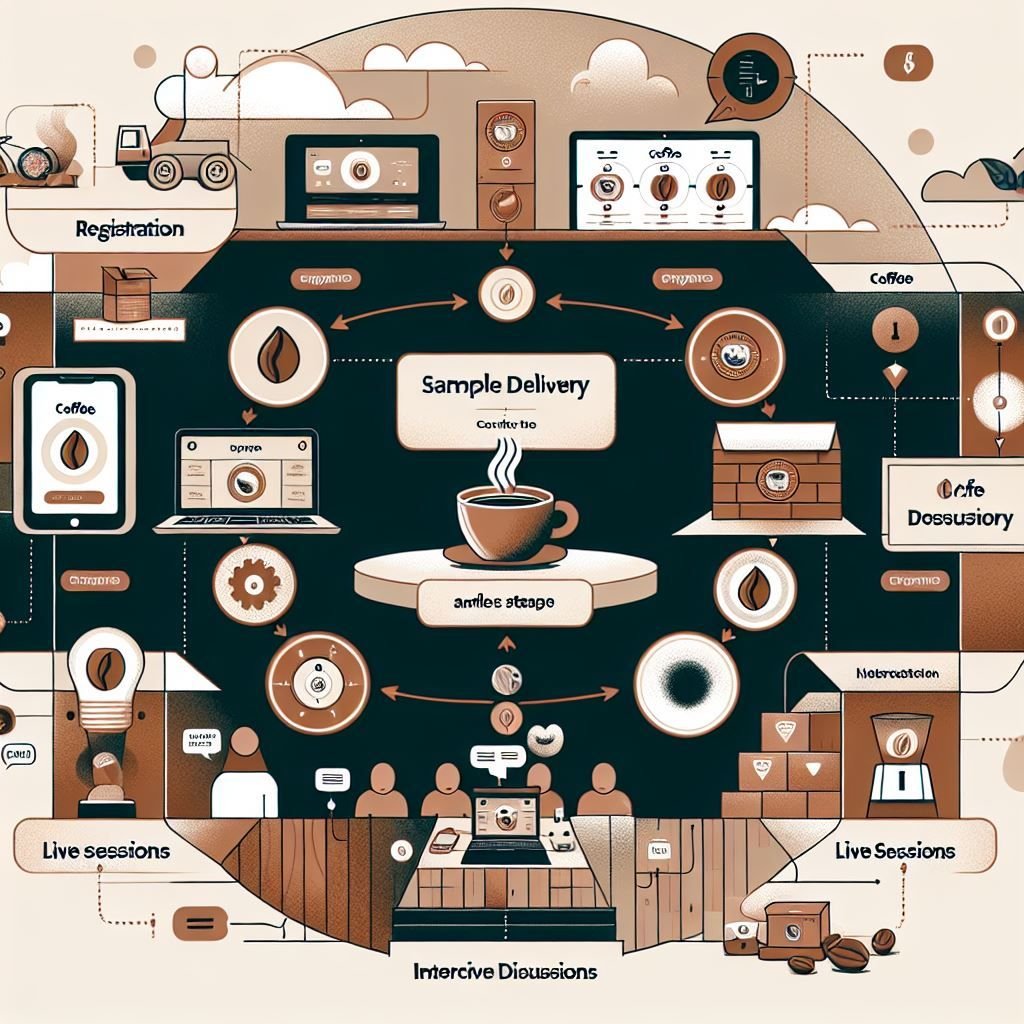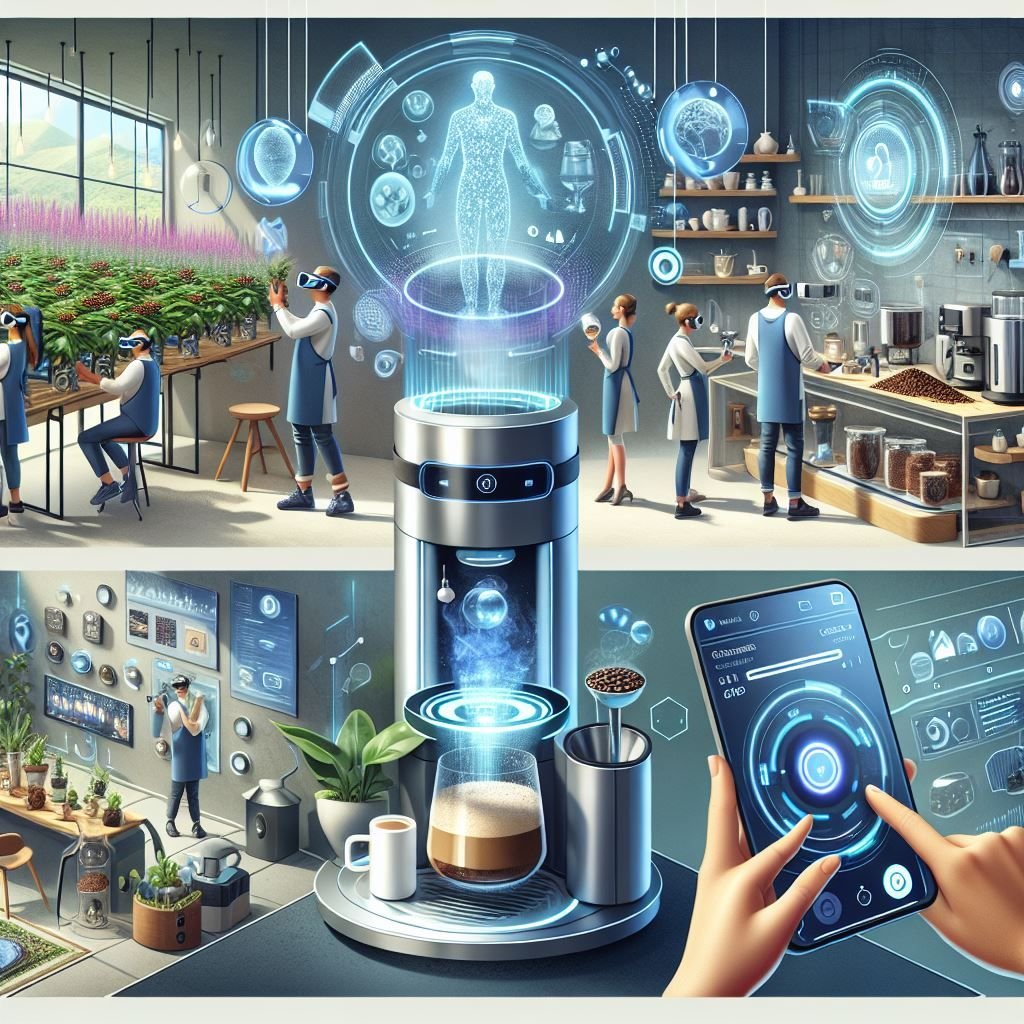Introduction
In the ever-evolving world of coffee culture, technology has become pivotal in how we experience and appreciate our favorite brews. Virtual coffee tasting has emerged as an innovative way to connect with coffee enthusiasts worldwide, offering an immersive experience that transcends geographical boundaries. This article explores the intriguing intersection of technology and coffee culture, delving into the tools, platforms, and innovations that make virtual coffee tasting possible.
Understanding Virtual Coffee Tasting
Virtual coffee tasting is a digital experience that allows participants to sample and discuss coffee from the comfort of their own homes. This modern approach leverages technology to create an interactive and educational environment, enabling coffee lovers to explore different brews, tasting techniques, and the art of coffee appreciation.
What is Virtual Coffee Tasting?

Virtual coffee tasting is an online event where participants receive a curated selection of coffee samples to taste and discuss in real-time with a coffee expert or a community of fellow enthusiasts. This experience is facilitated through video conferencing platforms, social media, and specialized apps, providing a highly engaging and informative way to explore coffee from around the globe.
How Does Virtual Coffee Tasting Work?
The virtual coffee tasting process typically involves several key steps:
| Step | Description |
|---|---|
| Registration & Sample Delivery | Participants sign up for the event and receive a kit containing coffee samples, tasting notes, and sometimes brewing equipment. |
| Live Session | On the event day, participants join a live video session where a coffee expert guides them through the tasting process. |
| Interactive Discussion | Participants share their thoughts, ask questions, and engage in discussions about the coffee’s flavor profiles, origins, and brewing methods. |
This structured approach ensures that participants not only taste the coffee but also gain a deeper understanding of its complexities and origins.
Tools and Platforms for Virtual Coffee Tasting

Several tools and platforms support virtual coffee tasting, each offering unique features to enhance the experience. Below are some of the most popular options:
Video Conferencing Platforms
Platforms like Zoom, Google Meet, and Microsoft Teams are commonly used for virtual coffee tasting events. These tools provide high-quality video and audio, screen-sharing capabilities, and interactive features such as chat and polls, facilitating seamless interaction between participants and the coffee expert.
Specialized Apps and Websites
Some coffee companies and organizations have developed their own specialized apps and websites specifically for virtual coffee tasting. These platforms often include additional features like tasting notes, brewing guides, and community forums, allowing participants to share their experiences and insights.
Social Media
Social media platforms like Instagram, Facebook, and Twitter are also utilized to host virtual coffee tasting events. These platforms offer broader reach and engagement through features like live streaming, comments, and hashtags, creating a communal and interactive atmosphere for participants.
Benefits of Virtual Coffee Tasting
Virtual coffee tasting offers several advantages over traditional in-person events, particularly in terms of accessibility, convenience, and education.
Accessibility
One of the primary benefits of virtual coffee tasting is its accessibility. Participants can join from anywhere in the world, making it easier for coffee enthusiasts to connect and learn regardless of their location. This global reach fosters the sharing of diverse experiences and perspectives.
Convenience
Virtual coffee tasting eliminates the need for travel, making it a convenient option for busy individuals. Participants can enjoy the experience from the comfort of their own homes, often at a time that suits them. This flexibility encourages greater participation and allows coffee lovers to fit these events into their schedules effortlessly.
Education
Many virtual coffee tasting events include educational components, such as discussions on coffee origins, brewing techniques, and flavor profiles. This makes virtual tasting an excellent way for participants to deepen their knowledge and appreciation of coffee. Expert-led sessions provide valuable insights that enhance the overall learning experience.
Challenges and Limitations
While virtual coffee tasting offers numerous benefits, it also presents certain challenges and limitations.
Technical Issues
Technical difficulties, such as poor internet connectivity, can disrupt the virtual coffee tasting experience. A stable and reliable connection is crucial to ensure smooth participation in these events. Organizers often provide troubleshooting tips, but technical issues remain a potential barrier.
Sensory Limitations
Virtual coffee tasting cannot fully replicate the sensory experience of in-person events. Participants may miss out on the subtleties of aroma and flavor that are best appreciated in a controlled, physical setting. While the tasting process is informative, some aspects of coffee appreciation are inevitably lost in a virtual format.
Social Interaction
While virtual platforms offer interactive features, they cannot replace the social interaction and camaraderie of in-person events. Building a sense of community can be more challenging in a virtual setting, and some participants may find it harder to engage meaningfully with others. The absence of physical presence may detract from the personal connections that often form during traditional tastings.
The Future of Virtual Coffee Tasting

As technology continues to advance, the future of virtual coffee tasting looks promising. Several emerging technologies could significantly enhance the experience, providing participants with even more immersive and personalized events.
Augmented Reality (AR) and Virtual Reality (VR)
AR and VR technologies have the potential to elevate the virtual coffee tasting experience by creating immersive environments that simulate the sensory aspects of coffee tasting. Imagine virtually visiting coffee farms, observing the brewing process up close, or even “tasting” coffee in a more realistic way. These technologies could revolutionize how we engage with coffee tasting in the future.
Artificial Intelligence (AI)
AI can be used to personalize the virtual coffee tasting experience by analyzing participants’ preferences and providing tailored recommendations. AI-powered chatbots and virtual assistants can also assist with answering questions and providing real-time information during the event, making the experience more interactive and user-friendly.
Integration with Smart Devices
The integration of smart devices, such as coffee makers and brewing equipment, with virtual coffee tasting platforms can provide participants with real-time feedback and guidance. This technology could help participants achieve the perfect brew, enhancing their overall coffee tasting experience and ensuring they get the most out of the event.
Conclusion
Virtual coffee tasting represents a fascinating intersection of technology and coffee culture, offering an exciting new way for enthusiasts to engage with and appreciate their favorite brews. While it presents some challenges, such as technical issues and sensory limitations, the benefits of accessibility, convenience, and education make it a valuable addition to the world of coffee. As technology continues to evolve, the future of virtual coffee tasting looks bright, with AR, AI, and smart devices set to create even more immersive and engaging experiences for coffee lovers everywhere.
Disclaimer:
The content on this blog is for informational purposes only and is not intended as professional advice. We strive for accuracy but cannot guarantee the reliability of all information presented.”
If you find any incorrect information in the blog, please inform us.
“This article reflects the author’s opinions and was created with the assistance of artificial intelligence.”




